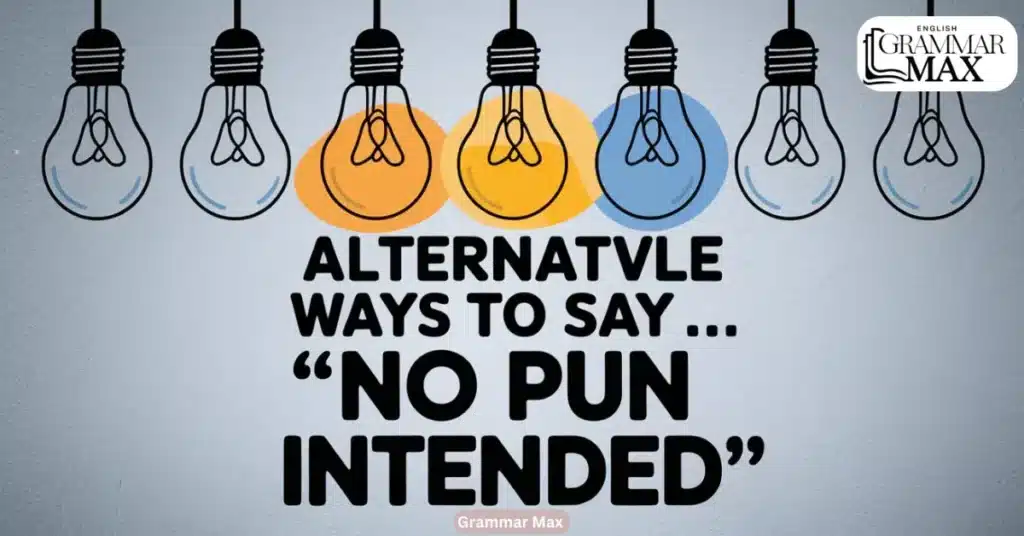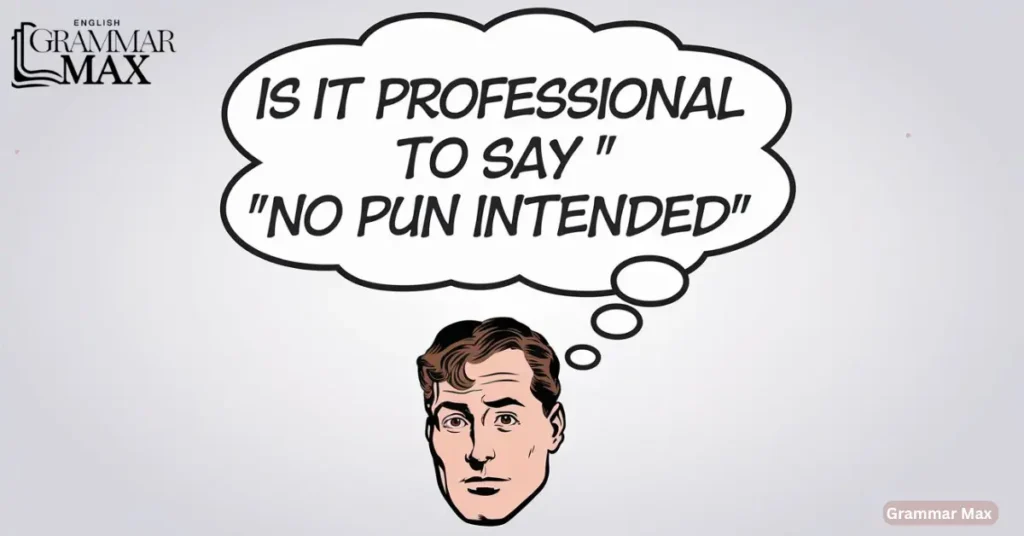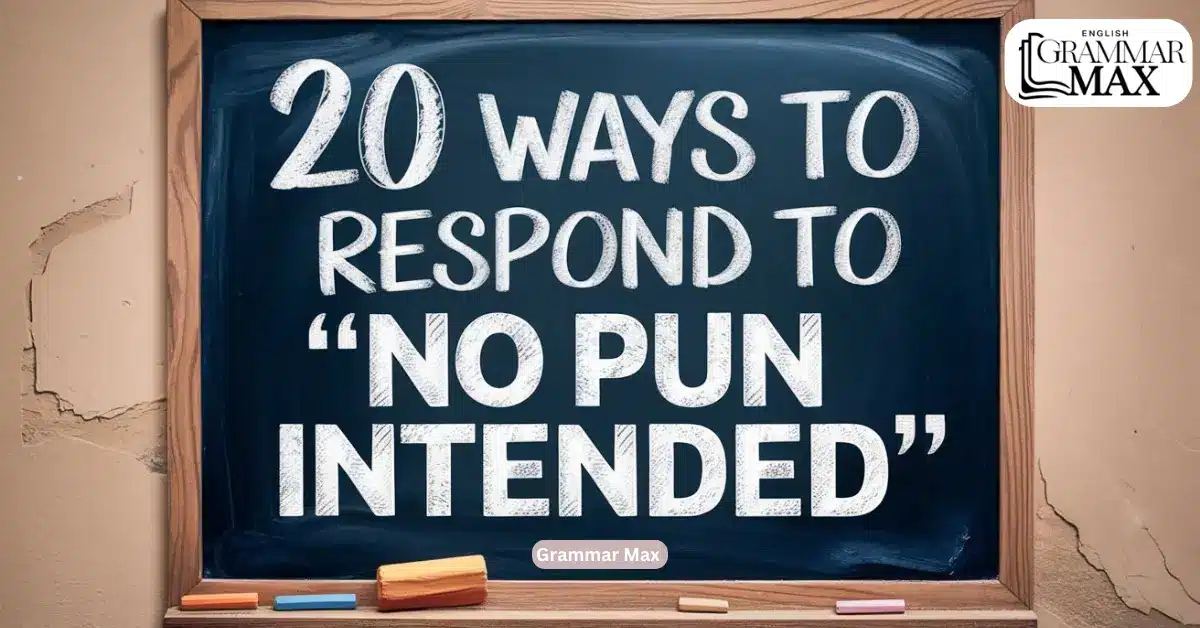No pun intended is a phrase often used when someone makes an accidental or unintended pun. Sometimes, these witty moments slip into conversation without planning, creating an unexpected bit of humor. When someone says no pun intended, they might feel self-conscious or unsure if their wordplay was appreciated.
However, responding creatively to this phrase can add to the humor, making the conversation even more fun. Knowing how to respond to no pun intended can help you turn an accidental pun into an enjoyable exchange and show your appreciation for spontaneous language humor.
Here, we will explore 18 clever, playful, and respectful ways to reply when someone says, “no pun intended.” These responses will help you become a master of conversation, whether you’re reacting to accidental puns or engaging in deliberate wordplay.
Alternative Ways to Say “No Pun Intended”

You can use these ways instead to say “No Pun Intended”:
- I see what you did there!
- No need to apologize!
- Well played!
- Pun accepted!
- The best puns are accidental!
- You’re a natural punster!
- No pun in 10 did!
- Don’t worry, I got the joke!
- No need to say sorry!
- That was pun approved!
- You’ve got a real talent for unintentional wordplay!
- Great response, I caught that wordplay!
- Nicely done, keep those coming!
- That was unintentional, but perfect!
- Whether intended or not, I loved it!
- Clever speaker, well done!
- Pun master in the making!
- No apology required, that was gold!
- That was a clever slip of the tongue!
- Pun recognized, no need to explain!
I see what you did there!
“I see what you did there!” is a playful and clever response that acknowledges someone’s use of wordplay. It shows that you’ve noticed the pun, whether it was intentional or not, and that you appreciate the humor. This phrase works well to keep the conversation light and witty.
By saying this, you’re validating their cleverness without making a big deal of it. It’s a perfect way to let the speaker know that their pun was caught and well received. This response can easily fit into both casual and professional settings, making it a versatile option in conversation.
Best use case:
In an email after someone makes a pun unintentionally in a project update, you can respond, “I see what you did there! Your word choice made me smile!” This response shows you’re engaged and have a sense of humor.
The best puns are accidental!
“The best puns are accidental!” is a response that highlights how unplanned wordplay can often be the most amusing. It suggests that the humor comes naturally and doesn’t need to be forced, making the pun even more enjoyable. This response praises the spontaneity of the joke without making the speaker feel awkward.
By saying this, you emphasize that unintentional humor can be just as impactful as intentional jokes. It encourages the speaker to continue their natural wit, reassuring them that their accidental pun was a success.
You’re a natural punster
“You’re a natural punster” is a compliment that recognizes someone’s innate talent for making puns, whether they intend to or not. It acknowledges their ability to create clever wordplay effortlessly, praising their verbal creativity. This response helps build confidence, showing appreciation for their spontaneous humor.
By using this phrase, you’re highlighting that their pun making skills come naturally, making them a wordplay genius. It’s a light hearted way to show admiration for their clever comments and encourage more puns, whether intentional or accidental.
Best use case:
After someone in a team meeting makes a joke without realizing it, say, “You’re a natural punster! We could use more of that wit around here.” It adds a positive and humorous tone to the discussion.
No pun in 10 did!
“No pun in 10 did!” is a playful, humorous twist on the phrase “no pun intended.” It’s a clever way to acknowledge the pun while adding a pun of your own, making the conversation more fun. This response is great for lightening the mood and showing that you’re enjoying the wordplay.
By using this phrase, you’re embracing the pun filled conversation and showing that you’re a fan of language humor. It’s a witty way to keep the pun game going and bring even more laughs to the exchange.
Best use case:
Replying to an accidental pun in a lighthearted group chat, you can say, “No pun in 10 did! Well done!” It’s a quirky and humorous response that keeps the conversation lively.
You’ve got a real talent for unintentional wordplay!
“You’ve got a real talent for unintentional wordplay!” is a compliment that acknowledges the speaker’s ability to make clever jokes without even trying. It highlights their knack for producing accidental puns and spontaneous humor, which often catches people by surprise. This response is a great way to encourage their natural wit.
By saying this, you’re emphasizing that their unexpected humor is a strength, even if it wasn’t deliberate. It’s a fun and lighthearted way to appreciate their verbal creativity and let them know their clever wordplay is well received, whether intended or not.
Nicely done, keep those coming!
“Nicely done, keep those coming!” is a supportive response that encourages someone to continue making puns or jokes. This phrase acknowledges the cleverness of their previous remark while expressing enthusiasm for more humor. It reinforces a positive atmosphere in the conversation, making the speaker feel appreciated and validated.
By saying this, you’re not only complimenting their witty remarks but also inviting them to share more of their unexpected humor. This response is effective in both casual and professional settings, as it promotes ongoing fun and maintains a light-hearted tone. It encourages a flow of spontaneous wordplay, enhancing the interaction.
Whether intended or not, I loved it!
“Whether intended or not, I loved it!” is a supportive response that expresses your enjoyment of someone’s humor, regardless of their intention behind it. This phrase reassures the speaker that their pun or joke was well received and appreciated. It creates a relaxed atmosphere, allowing for more spontaneous wordplay in the conversation.
By emphasizing that you loved the joke regardless of intent, you’re validating their creativity and encouraging them to continue expressing themselves. This response can be particularly effective in professional settings, as it maintains a positive tone while promoting a sense of open communication and humor.
Best use case:
In an email exchange, after someone unintentionally makes a pun, reply with, “Whether intended or not, I loved it! Keep it up!” It’s a great way to maintain rapport and humor.
Pun master in the making!
“Pun master in the making!” is an enthusiastic acknowledgment of someone’s potential to excel in creating puns. This phrase suggests that, even if their wordplay isn’t perfect yet, they possess the talent and creativity necessary to become a skilled punster. It encourages them to continue honing their humorous skills and experimenting with witty remarks.
By using this expression, you’re instilling a sense of confidence and motivation in the speaker. It reinforces the idea that anyone can become a pun master with practice and spontaneity. This response promotes a fun and supportive atmosphere, encouraging more playful banter in the conversation.
No apology required, that was gold!
“No apology required, that was gold!” is a reassuring response that conveys appreciation for someone’s unintentional pun. This phrase indicates that the joke was not only understood but also valued, elevating it to a level of excellence. By saying this, you encourage the speaker to feel comfortable and confident in their sense of humor.
This response emphasizes that there’s no need for regrets when it comes to humor, especially when it brings joy. Calling the pun “gold” signifies that it was exceptional and worthy of recognition. It helps foster a positive and light hearted atmosphere, inviting more spontaneous wordplay in the conversation.
Best use case:
In a casual email, after an accidental pun, respond with, “No apology required, that was gold! Well done!” It shows that you appreciated the humor and encourages more.
Is it Professional to Say “No Pun Intended”?

Using the phrase “no pun intended” can be professional, but context matters. It signals awareness of a potential misunderstanding or humor in a conversation, which can diffuse tension or lighten the mood. However, it’s essential to consider your audience; in formal settings, this phrase might come across as too casual or informal. If used appropriately, it can showcase your verbal creativity and ability to engage in playful communication. Ultimately, ensure that the setting is suitable for humor to maintain a professional image while still connecting with others.
Frequently Asked Question
What does “not intended” mean?
“Not intended” means something was not deliberately planned or meant to happen.
What does “intended meaning” mean?
“Intended meaning” refers to the specific message or significance that someone aims to convey through their words or actions.
Conclusion
Responding to no pun intended doesn’t have to be awkward or dull. In fact, using one of these 18 creative responses can turn an accidental pun into a memorable and enjoyable moment. Whether you’re responding to a colleague’s unintentional wordplay or engaging in witty remarks, the key is to have fun and keep the conversation light.
By mastering these ways to respond to accidental puns, you’ll add an extra layer of enjoyment to your interactions, encouraging humor, spontaneity, and clever communication. Whether the puns are on purpose or not, a good response shows that you’re not only paying attention but also ready to embrace the humor.

William Henry is a writer for Grammar Max, a blog that focuses on synonyms and phrases. He loves exploring the quirks of the English language and enjoys helping readers improve their vocabulary. William’s articles are easy to read, fun, and full of useful tips for anyone looking to better understand and use English. Whether you’re a student, a professional, or just someone interested in language, William’s writing on Grammar Max makes learning about words and their meanings simple and enjoyable.
